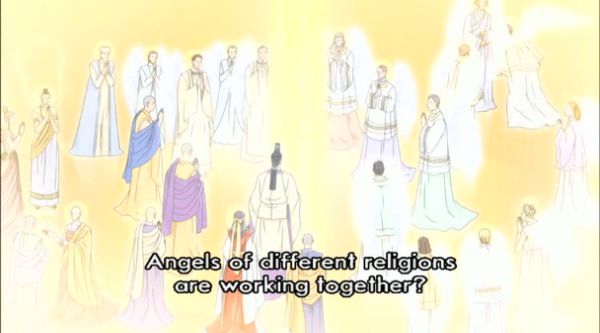Angels of different religions are working together?  Wouldn’t that be nice. This is how the  new Japanese religion “Happy Science” sees the world, although their concept of angels is closer to bodhisattva, or saint in English.
Google is very helpful. Â For instance, they have a wealth of information regarding Kofuku-no-Kagaku, or “Happy Science” as it is now called in English. Admittedly some of it is from people who are generally worried about sects, not least after another Japanese sect gassed the underground, killing several and sending hundreds to the hospital. Â But I ought to know that sects are not all the same. Â After all, I spent some of the best years of my life as a “sect member” in the Christian Church. Â Even Christianity itself was described as a sect when it was new (it’s in the Bible, mail me if you can’t find it). Â So that is not my worry. Â But there are bound to be doctrinal differences, given that they are not even Christians.
Then again… Â Let me quote from “Bibliography of Japanese new religions” by Peter Bernard Clarke:
“Kofuku-no-Kagaku considers, therefore, that humans have chosen the most appropriate life environment in order to practice their own ‘soul-training’. In this sense, their view on life on earth is quite different from that of the Judao-Christian tradition, for example.”
(It is spelled Judao-Christian now?) I cannot speak for the Judaists, but we Christians believe that it is God who chooses the most appropriate life environment in order for us to practice our ‘soul-training’. Â So yeah, there is a difference. Â If we chose it for ourselves, we might make a mistake and end up with a less than optimal environment. Â If God chooses, then “we know that all things cooperate for the benefit of those who love God, those who are called according to his design.” (Romans 8:28.) So yeah, there is a difference. Â But it is also strikingly similar, at least compared to the common view these days that all things happen by blind chance and that things cannot possibly be good unless they feel good.
Well, I prefer things that feel good myself, but I try to learn from other things too if they are not so bad that I am fully occupied with panicking…
Obviously the extensive mythology of Atlantis, Mu, the Greek gods etc is something alien to me. Â As I’ve said before, if they want to be literal about it, I can’t follow them there. Â (In that case, they should probably also avoid a job in geology and related sciences. Then again the same applies to Christians who are literal about Noah’s Flood.) But interestingly, Happy Science seem to accept central parts of the Bible, including the story of Moses and Jesus. Â I saw a trailer for one of their movies on YouTube, and it showed short sequences from those two. Â There is also a snippet from their movie “The Golden Laws” depicting the resurrection of Jesus Christ. Â (Albeit with two somewhat confused kids from the future as spectators.)
Anyway, it is kind of interesting that people living so far apart agree on so many things. Â I mean, until a few centuries ago our ancestors hadn’t seen their ancestors since the deep of the Ice Age. Â Why don’t they for instance think it is more important for your eternal life to eat with chopsticks than to be faithful to your spouse? According to the experts, religion is just a social glue, right? Â Obviously I don’t believe that. Â I believe that certain “laws of eternity” are written inside us, much like instincts are written inside animals, but we have much greater freedom in whether or not to follow them.

